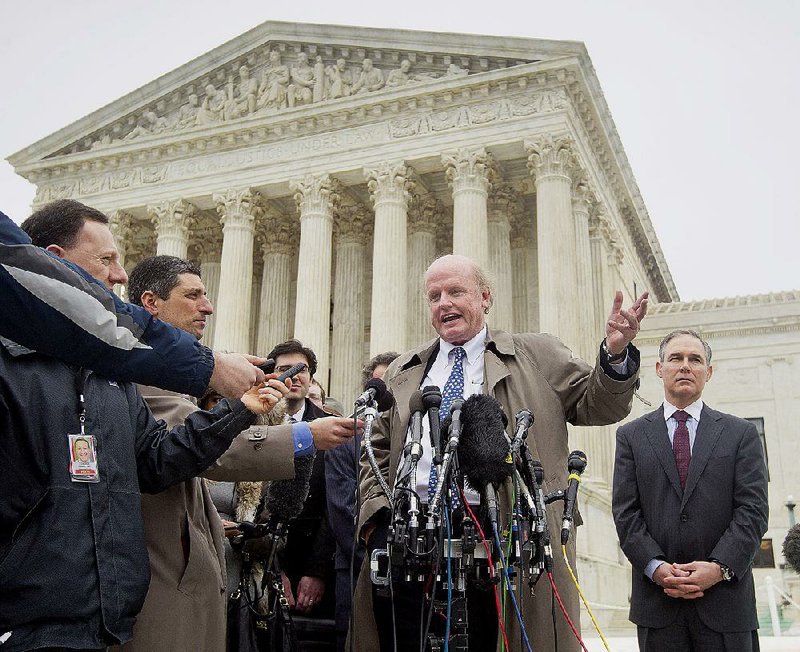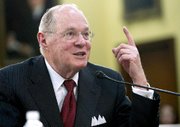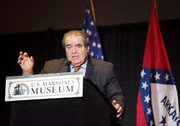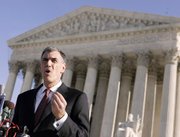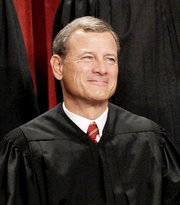WASHINGTON -- The Supreme Court took up a new challenge to President Barack Obama's health overhaul Wednesday in a dispute over the tax subsidies that make insurance affordable for millions of Americans.
RELATED ARTICLE
http://www.arkansas…">Senate OKs contingent ban on a state exchange
The high court's argument over the subsidies divided the justices along ideological lines, potentially leaving two members to decide the fate of the landmark law.
Chief Justice John Roberts, who cast the decisive vote to uphold the health care law in 2012, asked only a handful of questions and gave little indication which way he will go this time.
Justice Anthony Kennedy, who voted to invalidate the statute three years ago, asked questions of both sides in the one-hour, 20-minute hearing in Washington. He said limiting the tax credits to 16 states, as a group of challengers urges, would create a "serious constitutional problem."
The case centers on a four-word phrase that has become a linchpin of the law.
The measure says people qualify for tax credits when they buy insurance on an exchange "established by the state." Challengers say that phrase limits the tax credits to the states that have set up their own marketplaces, or online exchanges, for people to buy insurance.
The challengers say that phrase means subsidies aren't available in 34 states that didn't set up their own exchanges. Residents of those states instead use the federal healthcare.gov system, and an estimated 7.5 million now receive discounts.
Kennedy suggested the court might have to allow nationwide subsidies to avoid trammeling the rights of the states, which he said would face a choice between setting up their own exchanges or seeing their insurance markets collapse. He mentioned the legal doctrine of "constitutional avoidance," under which the court tries to interpret statutes so as not to render them unconstitutional.
At the same time, Kennedy indicated that he saw the challengers' reading of the law as the more natural one. At one point, he indicated he might be willing to side with them no matter the consequences.
"It may well be that you're correct as to these words, and there's nothing we can do," he told Michael Carvin, the lawyer representing four Virginians seeking to block the subsidies. "I understand that."
"This is a straightforward question of statutory interpretation," Carvin said.
But the four liberal justices disagreed, saying Carvin was ignoring the rest of the law. Justice Stephen Breyer said one provision says the federal government may create "such exchange," and this exchange can serve as an insurance marketplace in the state.
"So what's the problem?" Breyer said.
Justice Elena Kagan said Carvin's view made no sense in the context of the full law. "You would be setting up an exchange with no customers and no products" if the federally run exchanges could not sell insurance or offer subsidies, she said.
"We don't look at four words," Kagan said. "We look at the whole text."
Breyer echoed the point.
"If you want to go into the context" of the law, he told Carvin, "at that point your argument really is weaker."
Justice Sonia Sotomayor said Carvin's reading of the law would have devastating consequences. "We're going to have the death spiral that this system was enacted to avoid," she said.
But Justices Antonin Scalia and Samuel Alito went to Carvin's defense. The passage limiting subsidies to state exchanges "is a clear provision. You can't rewrite it" to mean federal exchanges, too, Scalia said.
During the second half of the argument, Solicitor General Donald Verrilli argued the law should be interpreted as Congress wrote it, which he said means the subsidies should be available nationwide.
He said Congress would not have said states were free to rely on a federal exchange, then include provisions that barred anyone from buying insurance on that type of exchange.
If Carvin's logic is followed, "you run into a textual brick wall," Verrilli said.
Alito and Scalia questioned Verrilli over the four words in the law.
"I mean, it may not be the statute they intended. The question is whether it's the statute that they wrote," Scalia said of the provision.
Verrilli argued that the law can only be read broadly because its purpose was to reduce the ranks of the uninsured. He noted that millions would lose health insurance if the court rules against the administration.
Alito raised the idea of the court delaying the effective date of a ruling against the administration so it wouldn't affect the 2015 tax year. Scalia said he believed Congress, where majority Republicans have staunchly opposed the law and held dozens of votes to repeal it, would act.
"You really think Congress is just going to sit there while all of these disastrous consequences ensue?" he asked Verrilli. "Congress adjusts, enacts a statute that takes care of the problem. It happens all the time. Why is that not going to happen here?"
"This Congress?" Verrilli answered, drawing laughter from the packed courtroom.
Roberts said little during the 85-minute hearing. His most substantive query explored Verrilli's contention that the court should defer to the interpretation of the Internal Revenue Service, which said the tax credits apply nationwide.
"That would indicate that a subsequent administration could change that interpretation?" Roberts asked.
The court's Democratic appointees made clear that they leaned toward the administration. Sotomayor joined Kennedy in saying Carvin's approach would improperly coerce the states into setting up their own exchanges.
"If we read it the way you're saying, then we're going to read a statute as intruding on the federal-state relationship," she said.
Kennedy said repeatedly that a ruling to take away the subsidies might create a constitutional problem because the states weren't told in advance that their residents would lose their subsidized insurance if state officials opted for a federal exchange rather than creating their own.
In the past, the court has said that state officials must be given a "clear notice" of any such important rules imposed under a federal law.
Officials in 22 states have said they were not told that if they opted for a federal exchange, their residents would not receive the subsidies.
But later in the argument, Kennedy said he was equally troubled by the government's approach.
"It seems to me a drastic step for us to say that the Department of Internal Revenue and its director can make this call one way or the other when there are, what, billions of dollars of subsidies involved here?" Kennedy said.
Kennedy is one of the court's staunchest advocates of states' rights. One lawyer who filed a brief opposing the tax credits said the justice's questions indicated his vote is up for grabs.
"He is the big question mark," said Cory Andrews of the Washington Legal Foundation. "That's the big takeaway from today."
At issue
A ruling against Obama's administration would put pressure on the 34 states, most of them Republican-controlled, that have refused to set up their own exchanges. Residents of those states would face the prospect of losing tax credits. Congress could step in, though Republican lawmakers oppose the health care law. The Obama administration says it can do little on its own.
The marketplaces, a central pillar of the law, allow Americans who don't get health benefits at work to shop online among plans that must offer basic benefits and cannot turn away customers, even if they're sick.
Consumers making less than four times the federal poverty level -- about $47,000 for a single person or $97,000 for a family of four -- qualify for subsidies to offset the cost of their premiums.
Those subsidies are considered essential to the marketplaces because they allow healthy people to buy coverage, offsetting the costs of sick consumers.
If the challengers prevail, an estimated 7 million people could lose access to the insurance aid, likely causing widespread disruptions to insurance markets nationwide.
White House spokesman Josh Earnest told reporters it would be "unwise" to draw conclusions from the justices' questions during the argument.
If the court ruled against the subsidies, "prices would likely go through the roof," Earnest said. "This is a fundamental part of the Affordable Care Act, and it's at risk."
The House and Senate's Republican majorities oppose the health law, and they also "struggle mightily" to accomplish even popular goals such as funding the Department of Homeland Security, Earnest said.
Outside the Supreme Court on Wednesday, dozens of people stood in line to hear the oral arguments.
About 70 people were in place by 6 a.m., hoping for one of about 50 seats in the courtroom for those who wanted to watch the arguments in their entirety. Kathleen Arberg, a Supreme Court spokesman, said there were also about 20 seats for people to rotate into the room and watch up to five minutes of the proceedings.
George Altshuler, a 26-year-old teacher from Washington, said he joined the line about 11:30 p.m. Tuesday with his girlfriend and her co-workers. They held a spot somewhere between No. 24 and No. 30 -- someone in line had made a list -- and hoped to witness what Altshuler called "a quintessential D.C. experience."
He said he hoped the justices would not rule in favor of the challengers to the law.
"It's nice to have that in the back of my mind, that I don't have to have health care through my job necessarily," he said.
John Osborn, a pediatrician from Fairfax, Va., huddled in line with the hood of his green raincoat pulled up. Osborn said he was there to see how the court would handle a question critical to his patients.
"From my standpoint, I take care of complicated kids, and a lot of them lose their coverage if this occurs, if it goes down, and so the impact of that is huge," he said.
"It's particularly problematic for children's hospitals. It's particularly problematic for kids with multiple problems."
A large crowd of demonstrators gathered on the steps in front of the court as the oral arguments approached, listening to people affected by the health care law talk about their experiences.
Standing near signs that read "The ACA Saved My Life," Adam Kelley, of South Berwick, Maine, became emotional recounting how being laid off from his job caused his family's health insurance premiums to skyrocket as he battled Crohn's disease.
"I feel safe knowing I cannot be discriminated against for having an incurable illness," he said, adding, "I'm proof that the Affordable Care Act is working."
On the other side of a line delineated by a banner declaring "Keep the IRS Out of My Health Care," a handful of the law's opponents waved signs and listened to speeches from a few conservative members of Congress.
Rep. Steve King, R-Iowa, who has been one of the most active opponents of the health care law, said Congress was willing to find a new way to insure those who would lose their coverage without the law.
"Where were they before Obamacare was, in such an ugly way, implemented?" he said. "They got retooled to get into Obamacare. They can get retooled to get into another system along the way."
A ruling in the case, King v. Burwell, 14-114, is expected in June.
Information for this article was contributed by Greg Stohr, David McLaughlin and Alex Wayne of Bloomberg News; by Adam Liptak and Emmarie Huetteman of The New York Times; by David G. Savage and Noam M. Levey of Tribune Washington Bureau; and by Mark Sherman and Ricardo Alonso-Zaldivar of The Associated Press.
A Section on 03/05/2015
